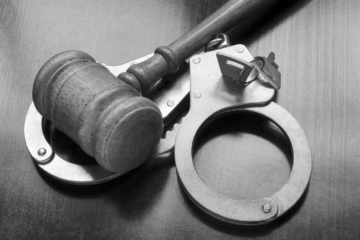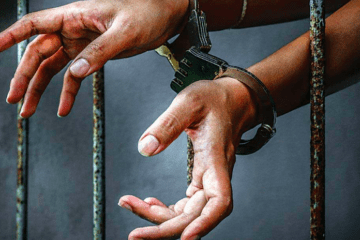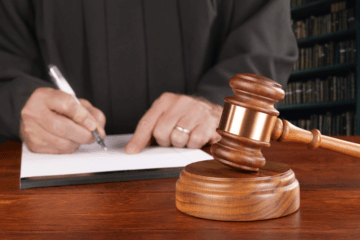
Introduction
Functionary means any person who holds an office or a trust or performs a particular function (an official) is known as functionary. In other words, the term is used to define a person who is employed in a public office and is entrusted to perform a certain function. There are five functionaries under the Code of Criminal Procedure, which are, the police, prosecutors, defense counsel, courts and prison authorities and correctional service authorities. These functionaries are important for the proper functioning of the code. The code clearly defines the powers and functions of each of the functionary mentioned in it.
The Police
The police officers are the most important part of the criminal law enforcement in India. They are mainly responsible for the prevention and detection of crime. The term police is not defined under the code, therefore, it is defined under the Police Act of 1861 to include every person enrolled under the said Act.
In each state, the Inspector General of Police is in charge of the overall administration of the State police force. However, for each district the responsibility is given to the District Superintendent of Police who is under the general control of the District Magistrate.[1]
The code confers various powers on police, such as the power to make arrest, search and seizures, etc. The police officers who are the officer-in-charge of the police station are given wider powers as they play a pivotal role in investigation and prevention of crime. As per section 36 of the Code, police officers superior in the rank to an officer-in-charge of the station may exercise the same powers throughout the local area to which they are appointed, as may be exercised by such officer within the limits of his station.
Section 151 confers the officers with the power to arrest a person without any warrant and orders from Magistrate to prevent the commission of any cognizable offences. The person arrested cannot be detained in custody for a period not exceeding more than 24 hours from his arrest. This period can also be extended if it is required by the various provisions of this Act or other laws in force.
According to section 154, the police officers have the power to record statements made orally in the commission of the cognizable offense. If the cognizable offence has been committed against a woman, then the statement shall be recorded only by a female officer.
Under section 156, the officer-in-charge of a police station may, without the order of a Magistrate, investigate any cognizable case within their jurisdiction.
Under sections 177 and 178 of the code, police has vide jurisdiction enabling the, to inquire a complaint which has already been filed in another jurisdiction.[2]
The Prosecutor
The public prosecutor is an independent authority and is not a part of any investigating agency. The main function of the prosecutor is to administer justice and to secure public purpose entrusted with him. Sections 24 & 25 of the code defines the appointment and qualifications for the Public Prosecutor and Assistant Public Prosecutor respectively. The Central Government and each State Government have power to appoint prosecutors for conducting prosecutions and other criminal proceeding on their behalf in the High Court, Sessions Court or the Court of Magistrate.
The code does not mention about the spirit in which the duties of the prosecutor are to be discharged, however, the principles in this regard are well-settled. In Shrilekha Vidyarthi v State of U.P.[3], the Apex Court highlighted the importance and nature of office of Public Prosecutors. It was ruled that this is a public office of much importance, and that present spoils system of appointments to the office of Public Prosecutor followed by political parties should be done away with.
PROSECUTORS IN HIGH COURT
Section 24(1) of the Code of Criminal Procedure provides powers to the Central Government or State Government to appoint a Public Prosecutor for every High Court. They can also appoint one or more Additional Public Prosecutors. The appropriate Government can appoint the Public Prosecutors after consultation with the High Court.
The eligibility of the person to be appointed as a Public Prosecutor is that he should be practising as an Advocate for not less than seven years.
PROSECUTOR IN SESSIONS COURT
Section 24 provides various rules regarding the appointment of Public Prosecutor and Additional Public Prosecutor for the Sessions Court. The District Magistrate in consultation with the Sessions Court Judge prepares a panel of names of persons who are eligible to be the Public Prosecutor or Additional Public Prosecutor of the Sessions Court. The State Government need to appoint the Public Prosecutor or Additional Public Prosecutor by the panel of names. Both the Central and the State government can appoint one or more Public prosecutor and Additional Public Prosecutor for the Sessions Court.
To appoint as a Public Prosecutor or Additional Public Prosecutor, the advocate must have practice not less than seven years.
SPECIAL PUBLIC PROSECUTOR
According to Section 24 (8) the Central Government or the State Government may appoint, for the purpose of any case or class of cases, a Special Public Prosecutor. The eligibility for the same is that he should have been in practice for not less than 10 years.
ASSISTANT PUBLIC PROSECUTOR
Section 25 of the code deals with the appointment of Assistant Public Prosecutors. The State Government has to appoint one or more Assistant Public Prosecutors for conducting prosecutions in different districts. According to section 25 (3) if no Assistant Public Prosecutor is available for a particular case, the District Magistrate may appoint any other person. However, a police officer shall not be appointed if he is below the rank of Inspector or has been a part of investigation into the offence with respect to which the accused is being prosecuted.
The Court
The principle role of the Courts is to protect rule of law and ensure supremacy of law. The code has clearly differentiated the powers and functions of each class of Court. Section 3 of the Code has classified various classes of Criminal Courts as,
- Court of Session;
- Judicial Magistrate of the first class and, in any metropolitan area, Metropolitan Magistrates;
- Judicial Magistrates of the second class; and
- Executive Magistrates.
Further, section 26 of the Code states that any offence under the Indian Penal Code may be tried by the High Court, the Court of Session or by any other Court as specified in the First Schedule of the Code of Criminal Procedure.
Sections 28, 29 and 30 of the Code deals with the various kinds of sentences that can be passed by different Courts.
The Defence Counsel
The adversary system of criminal trial assumes that the State using its investigative resources and employing a competent prosecutor would prosecute the accused, who, in turn, will employ an equally competent defence counsel to challenge the evidence of the prosecution.[4]
Therefore, both the Constitution under Article 22 (1) and the Code of Criminal Procedure under section 41D gives an arrested person the right to meet an advocate of his choice. The Code has also made provisions to ensure that an indigent accused is not denied fair trial. In trial before the Court of Session, the accused is not represented by a pleader and where it appears to the Court shall assign a pleader for his defence at the expense of the State.[5]
It has also been observed by the Apex Court that Article 21 of the Constitution implicitly requires the State to make provisions for the grant of fee legal services to an accused who is unable to engage a lawyer on the account of reasons such as poverty, indigence, or incommunicado situations. The only qualification needed to avail free legal aid would be that the offence charged against the accused is such that on conviction, it would result in a sentence of imprisonment and is of such a nature that the circumstances of the case and the needs of social justice require that he should be given free legal representation.[6]
The Prison Authorities and Correctional Services Personnel
At the conclusion of trial, if an accused is found guilty, the court is required may either pass a sentence of him or to deal with him under the probation laws and other special laws for the reformation and rehabilitation of the offenders.
The Code, however, does not make any specific provisions for the creation, working, or control of any machinery needed for this purpose, and it only depends on the laws like the Prisons Act, 1894; Prisoners Act, 1900; Borstal School Act; etc. Even regarding the machinery needed for correctional services, the Code is entirely dependent upon the laws like Probation of Offenders Act, 1958.
According to Section 3 of the Prisoners Act, the officer in charge has the duty to detain persons who are convicted until the person is removed in due course of law. Section 4 of the Prisoners Act gives the officers to return the order, writ or warrant to the court after the discharge of persons who committed the crime. The State Government has powers to appoint prison authorities. The prison personnel are appointed for the management of correctional services like providing recreational services and securing the safety of inmates.
[1] S.4, The Police Act, 1861.
[2] Satvinder Kaur v. State (Govt. of NCT of Delhi), (1999) 8 SCC 728.
[3] Shrilekha Vidyarthi v State of U.P., (1991) 1 SCC 212
[4] Report of the Expert Committee on Legal Aid, 70.
[5]S. 304 (1), Code or Criminal Procedure, 1973.
[6] Khatri (2) v. State of Bihar, (1981) 1 SCC 627.




2 Comments
Amit · August 1, 2021 at 3:50 pm
Great Explanation 👌
Admin · August 2, 2021 at 4:40 am
Thank you